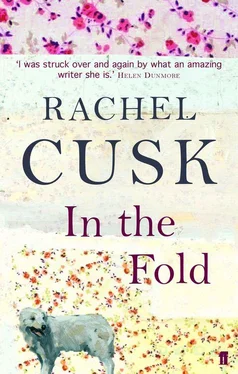Rachel Cusk - In the Fold
Здесь есть возможность читать онлайн «Rachel Cusk - In the Fold» весь текст электронной книги совершенно бесплатно (целиком полную версию без сокращений). В некоторых случаях можно слушать аудио, скачать через торрент в формате fb2 и присутствует краткое содержание. Год выпуска: 2006, Издательство: Faber & Faber, Жанр: Современная проза, на английском языке. Описание произведения, (предисловие) а так же отзывы посетителей доступны на портале библиотеки ЛибКат.
- Название:In the Fold
- Автор:
- Издательство:Faber & Faber
- Жанр:
- Год:2006
- ISBN:нет данных
- Рейтинг книги:3 / 5. Голосов: 1
-
Избранное:Добавить в избранное
- Отзывы:
-
Ваша оценка:
- 60
- 1
- 2
- 3
- 4
- 5
In the Fold: краткое содержание, описание и аннотация
Предлагаем к чтению аннотацию, описание, краткое содержание или предисловие (зависит от того, что написал сам автор книги «In the Fold»). Если вы не нашли необходимую информацию о книге — напишите в комментариях, мы постараемся отыскать её.
In the Fold — читать онлайн бесплатно полную книгу (весь текст) целиком
Ниже представлен текст книги, разбитый по страницам. Система сохранения места последней прочитанной страницы, позволяет с удобством читать онлайн бесплатно книгу «In the Fold», без необходимости каждый раз заново искать на чём Вы остановились. Поставьте закладку, и сможете в любой момент перейти на страницу, на которой закончили чтение.
Интервал:
Закладка:
‘Anyway, didn’t she eat earlier?’
‘No, I thought she could eat with us tonight.’
‘What are those green things? I don’t like those green things.’
‘You see?’
‘Those are peppers. They’re just peppers.’
Hamish looked around the shadowy room silently, as though trying to remember where he was.
‘— the spicy kind. The green kind. They’re there to make it look pretty.’
‘Once you let her get the idea that it’s up to her —’
‘I don’t like them.’
‘You’ve never tried them, Janie. Have you ever tried them?’
‘No, because I don’t like them.’
‘They don’t actually taste of anything,’ said Lisa.
There was a clattering sound.
‘— tell her that. Why are you telling her that?’
‘I’m just saying that they aren’t actually offensive.’
The room was filling with a blue, underwater light. It was like a reflection, a displacement: it seemed to have rolled in off the placid, darkening sea that lay out of sight nearby. Adam told me that the land these houses were built on had once lain under water. Hamish and I were sitting below sea level. The headlights of a passing car fled in a brilliant arc up the walls and across the ceiling, illuminating the empty pieces of furniture.
‘Look,’ said Lisa, ‘I’ll take the peppers out of yours, all right?’
‘That’s completely ridiculous.’
‘All right?’
‘Oh, for heaven’s sake don’t start crying.’
Mewling sounds came from behind the closed door. Hamish turned his head towards it.
‘Oh, honey, what’s the matter?’
‘Nothing’s the matter,’ I heard Adam say.
‘What is it, sweetheart?’
‘I don’t like peppers!’ wailed Janie.
‘Look, she just said she was going to take yours out!’ said Adam. ‘It’s completely ridiculous.’
‘I don’t like them!’
‘Why don’t you just give her something else? What’s the point of wasting good food on her? It’s completely ridiculous.’
‘You’re repeating yourself.’
‘Your mother isn’t a slave, you know! She’s got better things to do than cook three separate meals every evening!’
‘People are allowed not to like things,’ said Lisa.
‘I don’t like peppers!’ wailed Janie.
‘I know you don’t. Mummy’ll take them out.’
‘But I want something else! I don’t want that — I want something else!’
Hamish got off my lap and set off into the gloom. Presently I saw his shape passing in front of the large window.
‘But you said!’ said Janie.
‘Nobody said.’
‘They did!’
‘No they didn’t!’
‘Look, it’s nothing. I’ll just do something else quickly. I’ll do some fish fingers. It won’t take a minute.’
‘You’re giving in to her.’
‘I had fish fingers for lunch.’
‘I’m not giving in! I just happen to think it’s cruel to force children to eat things that disgust them.’
‘We had fish fingers at school for lunch.’
‘Well, in that case she should eat earlier. She should eat with the baby. It isn’t disgusting, you know, just because you don’t like it. Adults don’t eat disgusting things. Why would I eat something if it was disgusting?’
‘You don’t like tomatoes. Nobody forces you to eat tomatoes, do they?’
‘I do like tomatoes.’
‘I hate tomatoes,’ said Janie.
Their voices seemed to agitate the surface of a torpor at whose bottom I lay, untouched, like some sunken object that had slipped out of the bounds of light and fallen far beneath the reach of a commotion now both meaningless and mysterious. I wondered where Rebecca was, and the thought of her paid out above me, winding and waving upwards through the blue light until I could see its end, far short of any grasp. If she came to look for me, I thought, she would never find me.
I heard Lisa say:
‘That’s a lie.’
‘What?’
‘I said that’s a lie. You’re lying. You don’t like tomatoes.’
Adam said: ‘I can’t believe you’d accuse me of lying.’
He appeared to wish to confer on this accusation more seriousness than the dislike of tomatoes alone could sustain.
‘I’m just stating the facts.’
‘There aren’t any facts. I know what I like and what I don’t like.’
‘When I don’t like something,’ said Janie, ‘I put it in my pocket.’
‘What, food? You put food in your pocket?’
‘I take it out later and throw it into the bin.’
‘You put it in your pocket?’
‘When I don’t like something I do. Like stew — it’s got all those bits in it.’
‘You put that in your pocket?’
Hamish bumped into the darkened television set. It rocked on its stand and he cried out in alarm as a cascade of videos fell to the floor. Immediately the kitchen door opened. Hamish stood as though naked in the new path of light, his face petrified.
‘Oops-a-daisy!’ cried Lisa, before I could speak.
She trod swiftly over the carpet and gathered Hamish into her arms, and without a glance in my direction she carried him into the kitchen.
*
At ten o’clock, as I did the night before, I phoned Rebecca before it could be established, definitively, that she was not going to phone me.
‘I just got in,’ she said. ‘I just walked through the door.’
This, at least, was ambiguous: she might have been accusing me of pestering her, or she might equally have been mentioning her absence as the excuse for not having called earlier. There was a third possibility, which was that she meant to convey both things, irritation and guilt, at once. I envisaged these three interpretations as a sort of diagram, like a drawing of the chambers of the heart. In such drawings there were always little arrows to clarify the direction of flow, in through the blue veins and out through the red. Then there was the heart itself, which in spite of its centrality to all those veins, in spite of the appearance it gave of turning bad blood to good, was remarkable only for the intricacy with which it maintained separation between them. In those neat little chambers the blue and the red dwelt side by side, not mingling but merely proximate. It was the closest possible arrangement, like marriage, for contradictory traffic.
I distinctly remembered that when Rebecca and I first began our relationship we were possessed by the need to maintain spotlessness in our dealings with one another. As soon as a smear or mark appeared we cleaned it up, and although it was usually clear which one of us had, by error or accident, put it there, there was no sequel of recrimination or blame, merely the mutual desire to reinstate order. We were like two people running their separate businesses out of shared premises. I don’t know precisely when this decorous era ended, but by a certain point our modest, hopeful square footage had been abandoned for a different, more sprawling joint enterprise. I remembered that when Hamish was a very small baby Rebecca became distraught with him one afternoon, actually angry, and I was surprised that after six weeks she thought she knew him well enough to carry on like that. It suggested to me that her good conduct at the same stage in our own relationship was the result of a great and uncharacteristic exercise of self-restraint, an exercise that could be considered somewhat fraudulent, given that as far as I knew it was repeated nowhere else in her history. Rick and Ali were always pleased to fill me in on the parts of that history that predated my arrival. It sometimes occurred to me that Rebecca had seen in me the possibility for reform, if not outright escape from herself; that she saw me as some new, prosperous, unhistoried country, like Australia, to which she could emigrate and forget her problems. She discussed those problems with me, which mainly had to do with her childhood and her family, and owing to my inability to solve them, or perhaps merely to hear and respond to them correctly I soon superseded them and became the problem myself; leaving her, I suppose, with strong but muddled feelings of what appeared to be homesickness for the original problems, compounded by the sense that in allying herself with me she had effected some sort of betrayal of the things she loved. The real problem, in the end, seemed to be that I wasn’t related to her. If I had been her cousin, or even some old family friend, she would not have suffered so from divided loyalties, nor found herself to be carrying the disease of my difference from her, my innate hostility to the organism that was her life. That was as close as I could come to solving the problem — or rather diagnosing it, for there was of course no actual cure for this particular difficulty.
Читать дальшеИнтервал:
Закладка:
Похожие книги на «In the Fold»
Представляем Вашему вниманию похожие книги на «In the Fold» списком для выбора. Мы отобрали схожую по названию и смыслу литературу в надежде предоставить читателям больше вариантов отыскать новые, интересные, ещё непрочитанные произведения.
Обсуждение, отзывы о книге «In the Fold» и просто собственные мнения читателей. Оставьте ваши комментарии, напишите, что Вы думаете о произведении, его смысле или главных героях. Укажите что конкретно понравилось, а что нет, и почему Вы так считаете.












